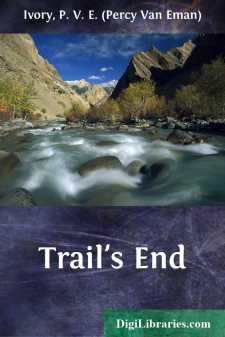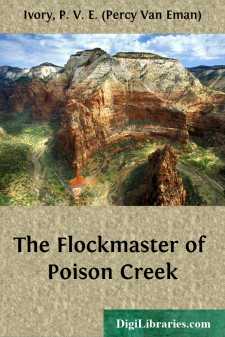Categories
- Antiques & Collectibles 13
- Architecture 36
- Art 48
- Bibles 22
- Biography & Autobiography 813
- Body, Mind & Spirit 142
- Business & Economics 28
- Children's Books 14
- Children's Fiction 11
- Computers 4
- Cooking 94
- Crafts & Hobbies 4
- Drama 346
- Education 46
- Family & Relationships 57
- Fiction 11829
- Games 19
- Gardening 17
- Health & Fitness 34
- History 1377
- House & Home 1
- Humor 147
- Juvenile Fiction 1873
- Juvenile Nonfiction 202
- Language Arts & Disciplines 88
- Law 16
- Literary Collections 686
- Literary Criticism 179
- Mathematics 13
- Medical 41
- Music 40
- Nature 179
- Non-Classifiable 1768
- Performing Arts 7
- Periodicals 1453
- Philosophy 64
- Photography 2
- Poetry 896
- Political Science 203
- Psychology 42
- Reference 154
- Religion 513
- Science 126
- Self-Help 84
- Social Science 81
- Sports & Recreation 34
- Study Aids 3
- Technology & Engineering 59
- Transportation 23
- Travel 463
- True Crime 29
Trail's End
Description:
Excerpt
CHAPTER I
THE UNCONQUERED LAND
Bones.
Bones of dead buffalo, bones of dead horses, bones of dead men. The tribute exacted by the Kansas prairie: bones. A waste of bones, a sepulcher that did not hide its bones, but spread them, exulting in its treasures, to bleach and crumble under the stern sun upon its sterile wastes. Bones of deserted houses, skeletons of men's hopes sketched in the dimming furrows which the grasses were reclaiming for their own.
A land of desolation and defeat it seemed to the traveler, indeed, as he followed the old trail along which the commerce of the illimitable West once was borne. Although that highway had belonged to another generation, and years had passed since an ox train toiled over it on its creeping journey toward distant Santa Fé, the ruts of old wheels were deep in the soil, healed over by the sod again, it is true, but seamed like scars on a veteran's cheek. One could not go astray on that broad highway, for the eye could follow the many parallel trails, where new ones had been broken when the old ones wore deep and rutted.
Present-day traffic had broken a new trail between the old ones; it wound a dusty gray line through the early summer green of the prairie grass, endless, it seemed, to the eyes of the leg-weary traveler who bent his footsteps along it that sunny morning. This passenger, afoot on a road where it was almost an offense to travel by such lowly means, was a man of thirty or thereabout, tall and rather angular, who took the road in long strides much faster than the freighters' trains had traveled it in the days of his father. He carried a black, dingy leather bag swinging from his long arm, a very lean and unpromising repository, upon which the dust of the road lay spread.
Despite the numerous wheel tracks in the road, all of them apparently fresh, there was little traffic abroad. Not a wagon had passed him since morning, not a lift had been given him for a single mile. Now, mounting a ridge toward which he had been pressing forward the past hour, which had appeared a hill of consequence in the distance, but now flattened out to nothing more than a small local divide, he put down his bag, flung his dusty black hat beside it, and stood wiping his face with a large turkey-red handkerchief which he unknotted from about his neck.
His face was of that rugged type common among the pioneers of the West, lean and harsh-featured, yet nobly austere, the guarantee of a soul above corruption and small trickery, of a nature that endures patiently, of an anger slow to move. There were bright hues as of glistening metal in his close-cut light hair as he stood bareheaded in the sun.
Sheep sorrel was blooming by the wheel tracks of the road, purple and yellow; daisy-like flowers, with pale yellow petals and great wondering hearts like frightened eyes, grew low among the short grass; countless strange blooms spread on the prairie green, cheering for their brief day the stern face of a land that had broken the hearts of men in its unkindness and driven them away from its fair promises....





